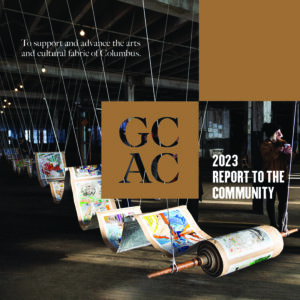2024 Operating Support
Application Portal
Description
The Operating Support program provides unrestricted funding as an investment in the general operations, administration and programs of eligible arts and cultural organizations in all disciplines.
Eligibility
Who is eligible to apply?
No new applicants will be accepted in 2024 unless previously approved by GCAC.
Applicants must be independent, historically financially-sound arts and cultural organizations that demonstrate the following attributes to be eligible to apply or maintain eligibility.
Financial Eligibility Requirements
- Over $500,000 three-year average adjusted audited revenue* (see following pages for calculation details);
- Are able to submit the most recent three years of audited financial statements as part of the reporting process;
- Applicants must have an independent audit that includes a statement of functional expenses. If the applying organization is a subsidiary of a parent company that already has audited financial statements, the parent company audit must be submitted along with reviewed financial statements of the applying
- Organizations that are headquartered in Columbus but with satellite sites outside of the city of Columbus must be prepared to submit Columbus-specific audit documentation for programming/operations only within the city of Columbus.
- Present a diverse revenue and support stream;
- Demonstrate a dollar-for-dollar cash match; and
- Have received at least one Project, General or Operating Support grant from GCAC previously.
Artistic Eligibility Requirements
- Primary focus and actual operations are artistic or cultural in nature;
- Demonstrate annual artistic programming for at least three consecutive years; Demonstrate exemplary artistic achievement.
- Demonstrate a wide-ranging impact on the city’s economy and tourism.
- Engage and compensate professional artists, including local artists.
City of Columbus & Nonprofit Eligibility Requirements
- Have held their own 501(c)(3) status for at least three consecutive years;
- Based in and primarily serving the city of Columbus; and
- Demonstrate a wide-ranging impact on the city’s economy and tourism.
Board Governance & Staff Eligibility Requirements
- Operate with professional management and artistic staff;
- Have at least one paid full-time staff member;
- Have a minimum of five members of the board of trustees; and
- Operate with a community-based board of trustees charged with legal and fiduciary responsibilities, including the hiring and evaluation of the chief artistic and/or executive directors.
Inclusion, Diversity, Equity and Access (I.D.E.A.) Requirements
- Have a demonstrated commitment to inclusion, diversity, equity and access;
- Commit to a better understanding of systemic racism, implicit bias and barriers to access; and
- Demonstrate planning and progress toward more diverse representation on board, staff, artists, vendor list and diversity, equity and accessibility in programming, outreach and marketing.
Timeline
| Application Opens | March 1, 2024 |
| Application Due | April 1, 2024 |
| Applicant Interviews | April and May 2024 |
| Applicants Notified | June 20, 2024 |
| Audit and FY Report Due | 105 Days after the organization's Fiscal Year |
| Final Report Due | August 5, 2025 |
NOTE: Beginning in 2024, GCAC will move to a biennial application cycle to lessen the annual grant writing burden on organizations.
In years ending with an EVEN number, such as 2024, organizations will submit a full application that includes robust narrative questions, financials, board & staff information, evidence of strategic planning, attention to equity and access internally and externally and in-person interviews with GCAC staff & board representatives prior to grant determination.
In years ending with an ODD number, such as 2025, a full application will not be required. Financial information will be collected from FY and Final Reports. Organizational updates will be captured through site visits with GCAC staff and board representative scheduled throughout the year.
Every year, organizations will continue to submit an annual audit and comparative financial spreadsheet as part of the Fiscal Year-end (FY) report as well as a Final Report capturing 12 months of data each August.
Application Questions & Uploads
How are awards calculated?
Awards are calculated using three-year average adjusted revenue, score, applied percentages and available GCAC budget. Award amounts are contingent upon funds available.
Organizational Questions
The following checklist is designed to gauge the overall health of arts organizations in our region. It is not expected that every organization have each policy or tool in place. GCAC will continue to review how we can strengthen arts nonprofits governance through workshops, consultants, and funding programs.
Please note the tools that your organization has in place or in progress below.
| Board bylaws | Crisis communication plan | Reserve policy |
| Board nomination process | D&O Insurance | Risk management assessment/plan |
| Board orientation & training | Diversity statement | Separation of duties policy |
| Board term limits | Emergency response plan | Staff and Board Evaluations |
| Capital maintenance schedule | Employee Handbook | Strategic plan |
| Capitalization policy | Gift acceptance policy | Succession plan |
| Code of Conduct policy | I.D.E.A. strategy/plan | Whistle blower policy |
| Conflict of Interest policy | Investment policy |
What are the application questions?
The application questions are focused on four key categories: 1) financial management 2) organizational leadership & planning, 3) Commitment to Inclusion, Diversity, Equity and Access (I.D.E.A.), and 4) artistic innovation & artist engagement. Below you will find the current narrative and short-answer questions to assist you in your preparation:
SECTION 1: ORGANIZATIONAL LEADERSHIP AND FINANCIAL MANAGEMENT
- Summarize your short- and long-term plans to stabilize/strengthen your financial position. Please note significant changes in operations, people, resources or programming in the past 12 months that will impact your finances.
- List up to three organizational objectives/goals for the upcoming 12 months or fiscal year. These can be financial, artistic, programmatic, strategic, structural, or policy goals.
- What is your strategy to recruit and train a diverse, engaged fiscally-responsible governing board and future staff? How is compensation for hired artists and staff determined (note any reference materials or industry standards used)?
- Other than compensation, what other ways do you holistically support your staff and artists. And how do you keep your board engaged?
SECTION 2: COMMUNITY ENGAGEMENT AND COMMITMENT TO INCLUSION, DIVERSITY, EQUITY AND ACCESS (I.D.E.A.)
- What specific efforts demonstrate your commitment to I.D.E.A., internally and externally?
- What progress have you made in increasing representation on staff and team in the past five years to better reflect diversity of Columbus? Be specific with numbers or percentages.
- Explain ways you have reduced perceived barriers (physical, geographic, economic, racial, cultural, social and artistic) to make your programming relatable, inclusive and accessible to the broadest community?
- Describe specific partnerships with and/or outreach efforts to historically- marginalized and/or under-resourced communities.
SECTION 3: ARTISTIC INNOVATION & ARTIST ENGAGEMENT
- Innovation: What artistic risks are you taking this year? How are you innovating your activities and programs?
- How do you engage with and employ local artists? Note other ways you support artists outside of compensation.
What data-based questions will be asked in the application?
- Number of total full-time, part-time and contract employees as of January 1, 2023
- Number of total full-time, part-time and contract employees as of as of March 1, 2024
NOTE: All support materials must be uploaded digitally to the online application system.
Mandatory Supplemental Materials:
- Current fiscal year Profit & Loss statement with budget and year-to-date actuals (also known as: statement of activities, income and expense statement)
- Current Balance Sheet (also knowns as: Statement of Financial Position)
- Financial forecasts for the next 12 months
- Current board of trustees list, with business affiliations
- Staff list
- Strategic plan
Optional Supplemental Materials (include if available and relevant):
- I.D.E.A. strategy or outlined plan
- Marketing plan and/or marketing samples
- Links to current or past media coverage
- Link to or upload of current or upcoming season
- Evaluation tool example and past evaluation/survey results
What demographic data will be collected in the application?
Basic demographic information is collected as part of the grant application process.
Organizations are required to report on the demographics of their staff and board of directors. We view data collection as an essential tool to our commitment to diversity, equity and inclusion. See APPENDIX F for details.
After Submitting – Reviews & Scoring
Initial Review
Following the deadline, applications and supplemental materials will be reviewed by Grants & Community Engagement staff members to make sure the application is complete and meets eligibility.
Applicant Interview
Applicants are required to participate in a virtual or in-person interview with GCAC staff and board of trustee(s). Organizations may bring up to three people to the meeting (staff, board or committee members, key volunteers, etc.). The interview is intended to be a conversation to learn more about the organization’s challenges and successes and discuss the specifics of the application. There is no need to prepare additional materials or a presentation.
Evaluation, scoring and voting
Grants are reviewed, evaluated and scored by the Creative Advancement Committee and later presented to the Board of Trustees for approval. Applications will be assessed in three categories for a maximum of 100 points (applications receiving scores of 60 or under receive no funding):
- Financial Management– up to 35 points
- Organizational Leadership & Planning – up to 25 points
- Commitment to I.D.E.A – up to 20 points
- Artistic Innovation & Artist Engagement – up to 20 points
Notification
Grant approvals are based on evaluations, interviews and available funding.
Following a vote from the Board of Trustees, applicants will be notified by email of the application award status (approved, approved with contingencies or declined). Emails are sent to the primary grant contact and the authorizing official (as listed in the online application system organizational profile). The organization is responsible for keeping the organization’s contact information up-to- date. You will receive special reviewer/committee notes (if applicable), scores and grant amounts in the notification email.
After Awarded – Contracts, Payments, Reporting
Grant Agreement
Following the approval of a grant, a grant agreement specifying the terms of the grant will be available in online application system under the “Requires Attention” heading. To accept the award, review the grant agreement and digitally sign by the date indicated. Please keep GCAC appraised of any major changes in the organization, especially changes to leadership or Financial Status.
Payments
Grantees will receive quarterly payments to take place on or before the following dates, after the Grant Agreement has been signed:
- June 30, 2024
- September 30, 2024
- December 30, 2024
- March 30, 2025
As always, all grant payments from GCAC are contingent upon available funds, including receipt of funding from the city of Columbus and Franklin County.
On-Site Visits
GCAC makes its most informed funding decisions using documentation of an organization’s activities, including planning and evaluation documents, progress updates and final reports. From time to time, staff and Board members may conduct on-site visits to Operating Support recipients to better assess the impact of the grant awards.
Also, organizations should be prepared to make available up to four complimentary tickets for all performances, exhibits or GCAC funded events at the request of the Grants & Community Engagement department so that staff or trustees can experience your programming live and to become better advocates for the arts in Columbus.
Required Reporting
Operating Support recipients have a multi-step standard reporting process driven by the organization’s fiscal year and the term of GCAC grant agreement. All reporting is submitted through the online application system portal, under the “Requires Attention” section, “Reports” tab.
NOTE: Ticket Fee Requirement
Recipients of Operating Support are required to apply the city of Columbus 5% arts and culture fee to all live admission tickets. For details, https://www.gcac.org/impact-of-the-arts/columbus– ticket-fee/.
Fiscal Year (FY) Report and Audited Financial Statements
These are due 105 days after an organization’s fiscal year end. You will find this in the online application system. Log in, scroll to the bottom to the “Requires Attention” section, in the “Reports tab,” there is a button to open the FY Report.
Please follow these steps:
- Upload the newly completed Audit in the “Supplemental Materials”
- Must include Statement of Functional Expenses. o Include management letter or other documentation provided by auditors, if
- Use the information from your audit to complete the Comparative Financial Statement. o In the “Supplemental Materials” tab, find the financial spreadsheet under Comparative Financial Statement. o Download the spreadsheet and then update the FY22 Actuals and FY23 Budget. Add comments on variances of 20%. Save it to your computer. The numbers in the audit and the updated Comparative Financial spreadsheet MUST This is critical.
Upload the revised/new spreadsheet to the section titled: Comparative Financial Statement UPDATED. o Using the data in your financial spreadsheet (pulled from your audit), complete the rest of your FY Report and submit by the due date indicated in the system.
NOTE: Failure to upload audited financial statements and the comparative financials spreadsheet and complete the FY Report on the due date will result in a reduction of the grant award in the amount of $500 per day overdue; the reduction will be applied to the next
If GCAC staff has to send more than two reminders for corrected info, there may be a penalty in the form of a reduced disbursement and/or score.
An extension may be granted by the Grants & Community Engagement department as long as the extension is requested in writing BEFORE the due date. GCAC staff has the authority to deny an extension if there is a history of unsupported extension requests.
Final Report
Due August 5 annually:
• A (30) day extension may be requested in writing BEFORE the due date.
• Failure to submit a final report within 60 days of the due date without an approved extension, may result in the cancellation of the remaining grant amount.
• Note that this date is based on ticket fee collection and allows for reporting of 12 months of ticket fee each year.
Publicity Requirements
Publicity/Donor Acknowledgement
Once you are awarded, say “Thanks!” in a public way. GCAC requires that all organizations and artists receiving funding demonstrate the public value of the arts by making others aware of awards received and acknowledging public funders.
Operating Support recipients should credit GCAC broadly for ALL of the activities of the organization on an on-going basis. This includes acknowledgement utilizing all channels available, such as: website, social media, press releases, print materials, curtain speeches, special events, e-newsletters, on-location signage, specific exhibitions or projects within a given year. Refer to APPENDIX A for more details of the contractual publicity requirements.
Removal from Operating Support
The Grants & Community Engagement staff monitors the eligibility status of Operating Support recipients and provides notification if the organization’s continued participation in Operating Support appears to be in jeopardy.
An Operating Support recipient may receive notice of impending ineligibility if the recipient:
- Receives a note of going concern in their audited financial statements (which is your auditor reporting a substantial doubt about your organization’s ability to continue operations); or
- Does not meet the minimum three-year average adjusted annual audited revenue of $500,000; or
- The organization’s sustainability is deemed vulnerable or at risk due to financial, board or leadership mismanagement or
The above reasons are considered just cause to designate an organization ineligible for the Operating Support program. However, with the recommendation of the Creative Advancement
Committee, the GCAC Board reserves the authority to terminate or extend an organization’s participation at any time.
Once a recipient organization has received notice of concern from GCAC, the notice must be distributed to all members of the recipient’s Board of Trustees. Organizations may be asked to submit their Board-approved solution and/or provide additional monthly/quarterly organizational and programming reports. Additional restrictions and requirements may accompany any grant. An organization’s failure to take corrective action and demonstrate annual progress and stabilization will make it ineligible for Operating Support. An organization cannot receive Operating Support without meeting all eligibility requirements for three consecutive years. GCAC staff and trustees may rely on external evaluations to assess the organization’s eligibility for future funding.



